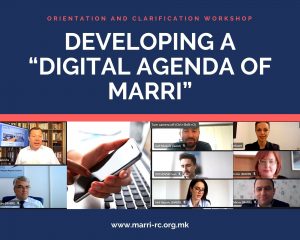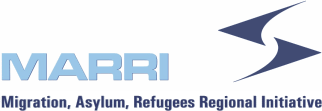 As both, migration and digitalization are global trends which will significantly shape the social, economic and political patterns in the coming decades, the RC Director Mr. Sashko Kocev took a new initiative and proposed a Digital Agenda which will include a digital transformation of the organizational activities, tools, processes, competencies and models, to fully balance the changes and opportunities in a strategic and prioritized way. A comprehensive background INFORMATION from the Integrated Expert Mr. Christoph von Harsdorf (GIZ PMD) served as basis and guiding idea.
As both, migration and digitalization are global trends which will significantly shape the social, economic and political patterns in the coming decades, the RC Director Mr. Sashko Kocev took a new initiative and proposed a Digital Agenda which will include a digital transformation of the organizational activities, tools, processes, competencies and models, to fully balance the changes and opportunities in a strategic and prioritized way. A comprehensive background INFORMATION from the Integrated Expert Mr. Christoph von Harsdorf (GIZ PMD) served as basis and guiding idea.
This initiative was welcomed by all six MARRI Participants at the Committee meeting in December 2020, and the RC Director was tasked by the MARRI Committee to establish a Working Group with Participants’ Administration, in order to:
- Gather and share information on innovative digitalization technologies;
- Define desirable technical and quality standards regarding office digitalization;
- Define desirable technical and quality standards regarding migration management digitalization;
- Standardise, harmonise and unitise digitalization equipment between all six MARRI Participants at MARRI Coordinator level and the RC;
- Invite mutually to digitalization trainings;
- Invite donors for funding digitalization equipment for all 6 Participants Administrations and the RC;
- Report annually back the MARRI Committee on the status of Digitalisation.
It was decided by the RC Director to have the First Meeting of the Working Group with some input from outside, funded by the GIZ PaCT Project.
In a 2-days Workshop, it was discussed how a Joint Understanding of the Digital Transformation Process could look like. Representatives of the MARRI Administrations and MARRI RC team were invited. The EU‘s Digitalization Agenda was explained, the INFORMATION from the Integrated Expert was used. The Workshop aimed at establishing a sound base for the functioning of a Working Group on MARRI‘s Digital Agenda.
Examples of some European organizations such as Big Data for Migration Alliance (BD4M) and European Migration Network (EMN) were presented, as well as the Digital Agenda of the German Federal Office for Migration and Refugees (BAMF) and Eurasian Economic Union. The participants of the workshop also discussed the concept, mechanisms, strategies and regulations about the processes of digitalization. In context of MARRI, the information management and optimization of collection and dissemination of information has a key role to the success of the digital transformation. Reference was made to the Knowledge Workshop end 2020, funded by the German Government and organised by GIZ PMD.
MARRI’s regional platform for migration data exchange in the Western Balkans (WB-MIDEX), funded by IOM, was presented by a seconded expert.
Discussing the EU approximation process and EC’s newest Digitalization policy, the participants tackled the EU Digital Compass 2030, the New EU Pact on Migration and Asylum and the EC’s measures in support of a Digital Agenda for the Western Balkans. The importance of a holistic transformation approach instead of an ad-hoc optimization was highlighted, more evident in the past years and further accelerated by COVID-19. The workshop was concluded with reflection about the possible areas of activity for developing of the MARRI Digital Agenda and the joint next steps forward.
A Second Meeting of the Digital Agenda Working Group will be held in early autumn 2021, hopefully with physical presence or in hybrid modus. At this meeting, a statistician newly seconded from IOM, will introduce him and familiarise the group with his work Agenda. The second meeting will also look into and discuss the Committee’s mandate and also – if so – which external additional expert support may be opportune. The Working Group will also deal with very practical questions like presenting the digital tools of the RC and assess the tools already available at Participants’ Administrations.
